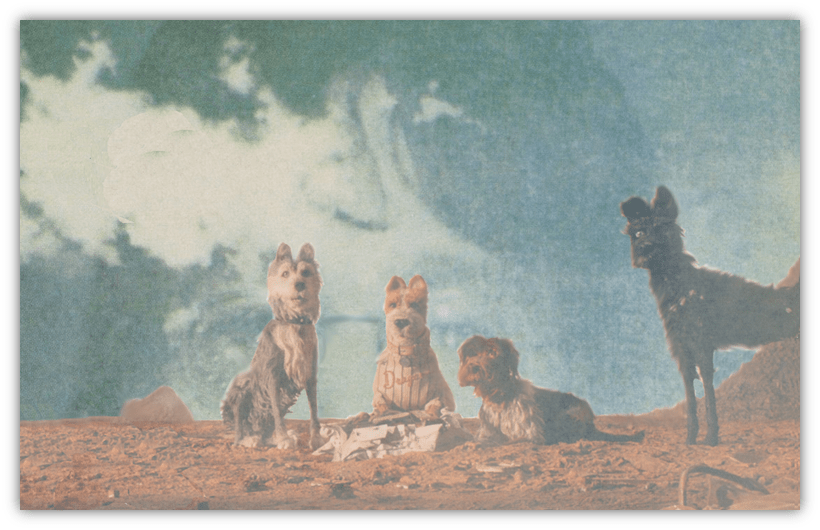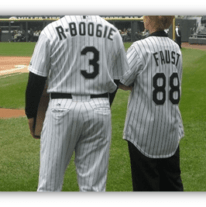The war against dogs; that’s the allegorical premise Isle Of Dogs.
In Wes Anderson’s 2018 stop-motion animated film, he uses animals as proxies, gives simultaneous accounts of racial division, past and present, and extrapolates this amalgamated time into a dystopian near-future.
The hegemony of cats; that’s the theological-based goal from an edict made manifest by Mayor Kenji Kobayashi (Kunichi Nomura). He’s the feline-loving, Megasaki City despot whose state-sanctioned program to oust the cat’s historical enemy to a William Golden-esque island named Trash, a designated landfill, gains momentum from his radicalized constituency.
Snout fever, a virus that can potentially retard every canine’s well-being across this island nation, justifies the mayor’s plan to cleanse his empire of man’s best friend. His followers are vehement; their position on the institutionalized ostracization of dogs made inflexible by state-sanctioned propaganda. Even if it came to light that Kobayashi’s own scientists manufactured the bug, it’s questionable if this transgression would make a dent in their unconditional loyalty.

Not dissimilar to Martin Rosen’s Watership Down, the 1978 British animated film about survivalist rabbits dealing with the encroachment of industrialization on their rapidly diminishing landscape, Anderson reimagines formalized religion by placing an animal at the center of the universe, substituting rabbit for dog, redolent of novelist Richard Adams’ theme that a spiritual life is not a domain exclusive to mankind.
Narrated over moving scroll paintings, according to Jupiter (F. Murray Abraham), a newfoundland, dogs inherited the earth, running wild over its expanse until Mayor Kobayashi’s ancestor rounded up all the canines for the purpose of eradicating them, setting the stage for an era of free-ranging cats. As dog folklore goes, a boy samurai beheads the archetypal cat lover and saves them from complete annihilation.
Well now you know that your
John Lennon, “Crippled Inside”
Cat has nine lives, babe
Nine lives to itself
But you only got one
And a dog’s life ain’t fun
When the young warrior dies, he returns as a god. The mongrels pledge their loyalty to the master and evolve into domesticated pets. The Age of Obedience, an era spanning millennium upon millennium, finds itself on the brink of cessation. Yoko Ono knows the canid scrubbing has origins that are prejudicial, not spiritual, in nature; a Yoko Ono in italics. The octogenarian performance artist/singer-songwriter plays herself in Isle Of Dogs.

It’s more than stunt casting. Wes Anderson has something to say.
If you only see cultural appropriation, you’re not paying attention. “God”, a major album track from John Lennon’s second album Imagine (co-produced by Phil Spector), whose lyrics Anderson interpolates as an apparatus of utopian ideals to demonstrate how faith and peace can sometimes be mutually exclusive ideologies.
I don’t believe in magic
John Lennon, “God”
I don’t believe in I-Ching
I don’t believe in Bible
I don’t believe in Tarot
I don’t believe in Hitler
I don’t believe in Jesus
For appearance’s sake, this alternate universe Japan (a democracy in name only), the six-time incumbent mayor makes allowances for “free speech” and cedes the floor to Professor Ichigo Watanabe (Akira Ito), the Science Party candidate. Since Anderson, an arch-post-modernist, cast Yoko Ono as the professor’s assistant named “Yoko Ono,” the audience can’t help but surmise that Watanabe is being posited as a stand-in (a specter) for the late musician John Lennon, Ono’s partner, both, in life and art.
Lennon, only forty-years-old at the time of his abrupt death, in an envisaged posthumous role as a scientist is a conceptually sound piece of whimsy, given the assumptions made by the general public about the former Beatle’s stance on the metaphysical. The coffee table book Imagine John Yoko, an oral history about the making of the 1971 album (that spawned the oft-covered, arguably, indestructible title track), however, melts away the perception set in amber that Lennon was indoctrinating his fans into heathen personages. “John was a very religious person belonging to no denomination,” according to Ono, but he wasn’t a big fan of the “my god is bigger than your god,” mindset that steers a nation toward grassroots fundamentalism.

To this galvanized audience, at the municipal center, the scientist makes his case for dogs. Whereas John Lennon wrote a song cycle that promoted a message of love, Professor Watanabe, a pacifist in a lab coat, gives the latest progress report on a dog serum he promises will “quell dog hysteria” which he warns “has crippled our moral judgement.” Such criticism enrages the partisan mob, hardened men and women with no time for self-introspection, prompts Yoko Ono to move from the dark side of the stage and into the spotlight, deflecting thrown furniture and fruit (notably, a GRAPEFRUIT, a reference to Ono’s 1964 poetry collection) aimed at the professor, whose contrarian rhetoric ends up expediting the dogs’ expulsion by mayoral decree on the spot.
Well, I don’t wanna be a soldier mama,
john lennon, “I Don’t Want To Be A Soldier, Mama, I Don’t Wanna Die”
I don’t wanna die
Well, I don’t wanna be a sailor mama,
I don’t wanna fly
Well, I don’t wanna be a failure mama,
I don’t wanna cry
Well, I don’t wanna be a soldier mama,
I don’t wanna die
Atari Kobayashi (Koyu Rankin), the mayor’s ward, never planned on being a soldier in anybody’s war, but unforeseen circumstances presses the orphaned boy into conscription. With much derring-do, he steals a single-engine plane and flies across the Japanese archipelago on a mission to recover his bodyguard and best friend, Spots (Liev Schreiber) who shares the boy’s surname, Kobayashi. As Atari struggles to land his plane, five mutts watch with emotional detachment, speaking in wry voices, translated from barks into English, exchanging words that suggest they long-stopped dreaming about being rescued, and accept their lives as flea-ridden castaways.
The four-legged islanders greet Atari when he regains consciousness, recognizing in an instant, perhaps, his resemblance to “The Boy Samurai” from legend. Anderson underscores the master/servant dynamic, a commonality in all monotheistic religions, functioning not only as a surrogate for the lone authority figure in Peter Brook’s The Lord Of The Flies, but more pointedly, a messiah figure; a conduit for the child-god who rose from the dead after slaying Kobayashi’s favored ancestor.
But gods don’t cry. Soldiers cry. Atari mistakes a skeleton in the locked cage for his beloved pet. And yet, he appoints himself pack leader, transforming the doghouse into a church. A brilliant array of translucent colors radiates from the consumer junk these dogs appropriated as building material for shelter, which transmutes into a stained glass of sorts when Atari testifies. “Sit,” he proselytizes; the dogs sit. Commands are a dog’s dogma. Chief (Bryan Cranston) won’t sit; he leaves the fellowship in a huff. The stray doesn’t believe in masters.
But for morale’s sake, the irreligious dog keeps his heretical disobedience in check, despite his unstated resentment of the boy’s privilege. But Atari is adopted, a “Working Class Hero”, a stray like Chief, orphaned, in a flash, after he survived a train wreck that claimed the lives of his parents; his mama. I Don’t Wanna Be a Soldier Mama I Don’t Wanna Die was not organic to Imagine; it’s an older song but went unrecorded during the Plastic Ono Band sessions. The interim between both albums corresponds to Atari’s transformation from boy to soldier; the time it took for “The Boy Pilot” to rebel against his uncle.
No short-haired yellow-bellies son of Tricky Dick
john lennon, “Gimme Some Truth”
Gonna Mother Hubbard soft soap me
With just a pocketful of soap
Money for dope, money for rope
Everybody is looking for truth in Isle Of Dogs.
Professor Watanabe is naive; he lacks John Lennon’s cynicism. The scientist trusts the politician, making him an imperfect analogue. “Our society is run by insane people for insane times,” Lennon once said, referring to Richard Nixon, the “Tricky Dick” who ordered the C.I.A. to surveil the fab subversive. Watanabe is more like Lennon in his youth, playing The Cavern Club, just another Liverpudlian lad, untouched by fear and loathing without the faintest idea of the violent death that awaits him. After running the dog serum through a battery of successful tests, the proof he needs to announce snout fever as a curable virus, Mayor Kobayashi burns the results and places Watanabe under house arrest. His sushi is laced with poisoned wasabi. The press reports the coroner’s findings as a suicide. That’s not the truth.
Tracy Walker (Greta Gerwig) is the walrus. The American foreign exchange student writes for The Daily Manifesto, her school newspaper. From the outset, the cub reporter knows the Megasaki City mayor is a crook. At a staff meeting, the editor tells Tracy: “I don’t print hunch,” only conspiracy theories. In “God”, the line “I don’t believe in Kennedy,” can be construed as Lennon’s skepticism about the results of The Warren Commission. Tracy gives it to the editor straight; it’s a conspiracy. That’s her hunch. But when news breaks on Professor Watanabe’s death, she believes the official story, not recognizing the untimely death as part of her conspiracy theory about genocide. Tracy’s break from I.S.A.’s isn’t a clean one. That’s because she is a master herself; a dog owner.
Imagine there’s no countries
john lennon, “Imagine”
It isn’t hard to do
Nothing to kill or die for
And no religion too
Imagine all the people living life in peace
Once upon a time, Spots believed a dog was man’s best friend, never once questioning the righteousness of the human animal. Trained as a bodyguard, a concession made by the Megasaki autocrat that the cat has its limitations in regard to the reciprocation of love, Major Domo (Akira Takayama), the mayor’s henchman, manages the assignation, through his discouragement of anything less than a professional relationship. But nothing can stop a dog’s devotion to his master. There is no higher calling.
And then there was the purge.
For the first time, Spots questioned his belief system, starting with the legitimacy of man. And loses his religion. He’s not that “good boy” Atari remembers. The aboriginal dogs saved him from certain death; he’s one of them now. Spots breaks the covenant with his master. But was there one in the first place? Jupiter is not an omniscient narrator. The newfoundland also participates in the story; he’s a dog the searchers meet en route to animal testing laboratory where Spots called home. Jupiter is both, a part of, and apart from, the diegetic world.
His sidekick, Oracle (Tilda Swinton), a self-stylized clairvoyant, gets outed as a fraud. King (Edward Norton) quickly diagnoses the pug’s divinations as shtick. Oracle understands English. Jupiter is a fallible narrator. “The Boy Samurai and The Headless Ancestor” was probably something Oracle learned from watching TV. From puppyhood, the dog is indoctrinated into believing in masters because their origin story tells them that it’s integral to their essence. But “The Age of Obedience” is how man marks time. Without his master, living among lab test animals, contemporary aboriginals, Spots’ world is stripped down to empiricism, echoing John Lennon’s “God”: “I just believe in me/Yoko and me.” Spots only believes in Peppermint(Kara Hayward), his mate, who’s expecting.
You got to live
john lennon, “”It’s so hard”
You got to love
You got to be somebody
You got to shove
Professor Watanabe’s assistant sits on the last seat at the end of an empty milk bar. The Science Party tried, but taking down a state-sanctioned cult of cat; “It’s So Hard”. The dream lives on, however, in the party’s most ardent advocate, Tracy from Ohio. That’s what art can do, even when the artist stops believing. “Do I have it?” she asks Yoko Ono, who glances at the shoved folder, bulging and overflowing with paper, and answers: “Too late.” Tracy grabs Dr. Ono by the shoulders, shaking her, begging her to “start acting like a scientist.”
She gives the barkeep a signal. The last glass container of dog serum slides into frame. From the look on Professor Watanabe’s assistant’s face, the audience can tell she played a role in its creation. Yoko Ono, in our world, would fight and receive a co-writing credit for “Imagine” from the N.M.P.A. in 2017. Professor Watanabe “wasn’t man enough to let her have credit for it.” When he was poisoned, the secret died with him. “Tracy”, she shouts, as the student journalist is halfway out the door, perhaps, wanting some credit, but lets the revelation die on her lips, telling the girl, instead, to “be careful.” Journalists, especially female ones, she knows, can sometimes wind up dead in totalitarian governments.
People who are in the War Industry are totally unified in their ideals. They want to make war, kill, and make money.
Yoko Ono Lennon – 18 Feb. 2018
Cats can’t be trained to attack people. In the climactic fight between war and peace, after the dust settles, the mayoral cabinet’s cats flee from the scene of the aftermath in all directions at once. They’re not even loyal to each other. As it turns out, brainwashing the Megasaki citizenry into supporting a state-sanctioned euthanization program was just a preliminary step for the police state Kobayashi imagines. His robotics division created replacement pets, mechanical dogs that can kill its owner with radio-controlled precision. The cat was used as a decoy to give the mayor’s consolidation of power a benevolent sheen. Yoko Ono, In the preface for IMAGINE JOHN YOKO, writes that “it’s time for action,” and that “action is peace.”
The dog serum is “Imagine” in a bottle.

When Atari, Chief’s new master, injects the blue liquid in his born-again dog, Spots’ younger brother by five seconds proclaims: “That’s a great serum,” as in song. If peace was a science, Isle Of Dogs suggests, and universal love solvable through math, Ono’s utopian dream could be realized. Unlike Spots, the man-fearing dog forgives the breeder who drowned their sisters. Chief is tired of being lost, whereas Spots no longer believes that man moves in mysterious ways.
But by the end of Isle Of Dogs, the reunited brothers whose lives were characterized by independence and servitude, respectively, find solace in balance, a new way of being, not guided by an over-arching belief system that denies them access to the ether where a collective dog experience converges.
If you can imagine a world of peace, if you can imagine a world with no denominations- not without religion…but without this divisive ‘My god is bigger than your god’s business’
John Lennon, 1971
They live like cats. Megasaki City’s new mayor, Atari Kobayashi, recognizes the congruity of pre-Age of Obedience dogs and their rival felines. Chief gets to select his own mating partner, Nutmeg (Scarlett Johansson), Tracy’s bitch, rather than being put up on the open market for stud service. Meanwhile, Spots, a servant to man no more, maintains a feral cat lifestyle; man serves him. Every day, a priest feeds the dog and his family regular meals at a former cat house of worship, a shrine gone non-denominational, denoted by the removal of all cat iconography.
It’s “Imagine” imagined, a utopia.
Let the author know that you liked their article with a “heart” upvote!





Great write-up, Cappie! You made me see Isle of Dogs with new eyes, which is for the better because I didn’t quite like it when I saw it. I was annoyed by the Japanese setting being merely ornamental rather than substantive, but I should have reminded myself that ornamentalism is Anderson’s stock in trade. I should give the story another chance with your essay in mind.
Small correction: “God” is on Lennon’s Plastic Ono Band LP, not Imagine.